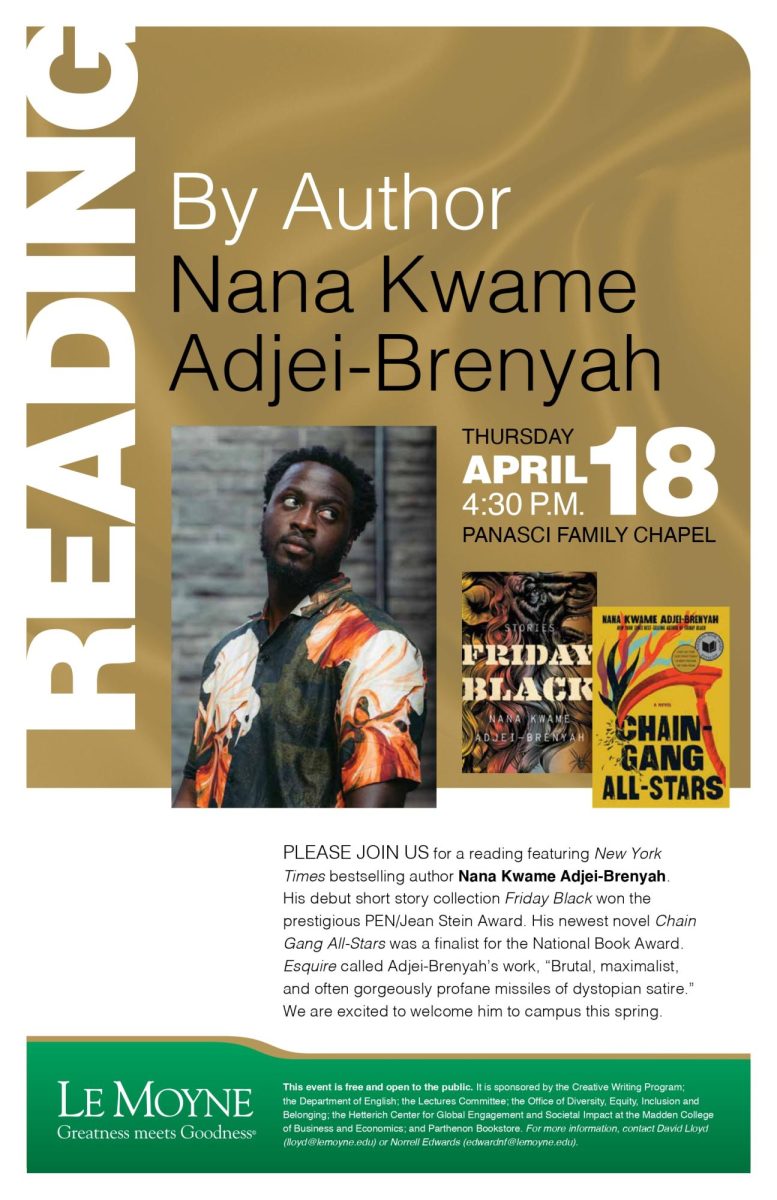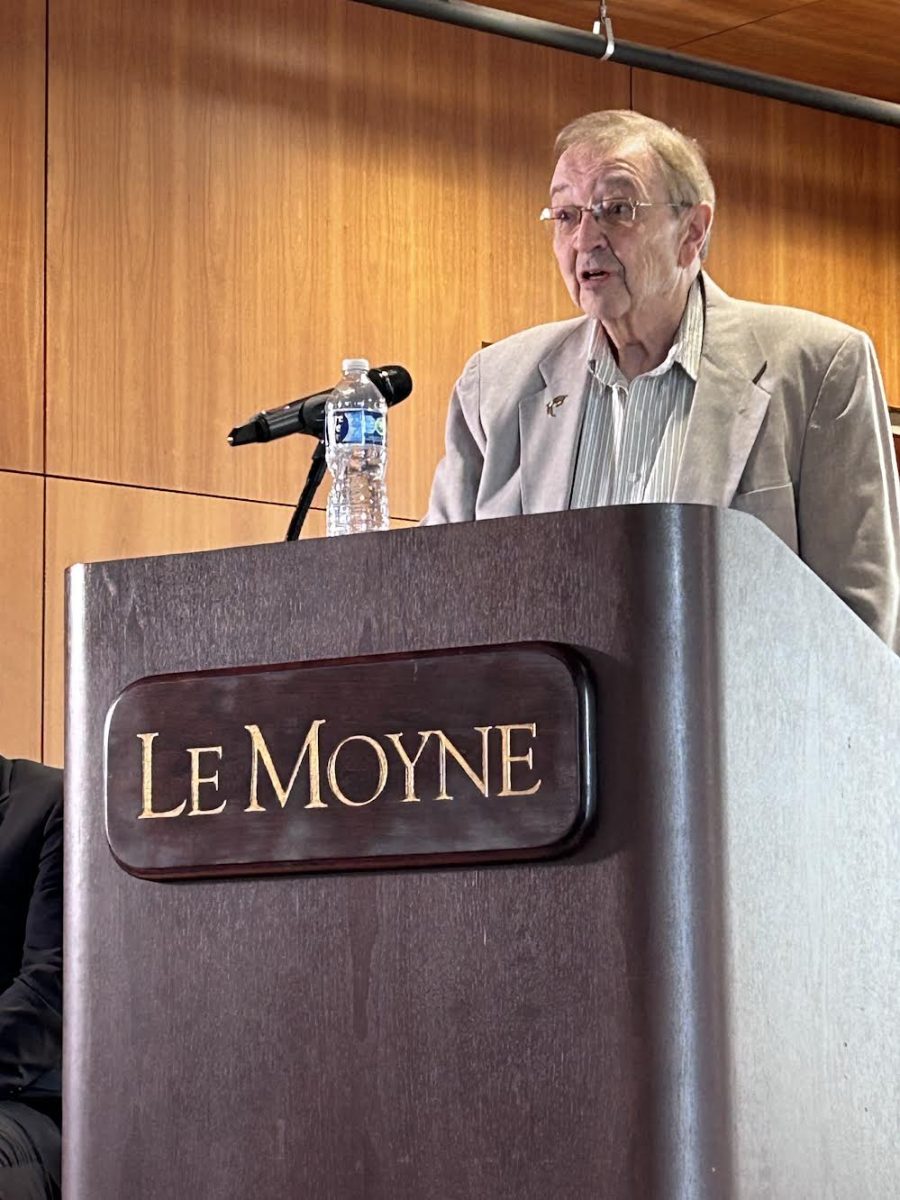Many people squirm or turn away from the sight of insects, put off by their mysterious morphologies and functions. Insects are incredibly overlooked for their importance to our lives and the environment, but Dr. Sherilyn Smith, one of our biology professors here at Le Moyne, advocates for their beauty and intriguing stories.
“Become more aware that everything is connected to everything else,” Dr. Smith advises. This lesson has been a recurring subject in Dr. Smith’s work and life, as seen by her research of insects worldwide and the classes she taught at Le Moyne, including Poisoning of the Planet. Her impact on Le Moyne is significant, and we wish her luck as she sets out on her next adventure: retirement.
Dr. Smith started working as an educator in 1983 and has been a member of the faculty at Le Moyne since 1995. She also taught at Siena College and Skidmore College. She studied ancient medieval history for her undergraduate degree at Wichita State University in Kansas and earned her Master’s in biology. After Wichita, she went on to receive her Ph.D. in entomology (the study of insects) from Kansas State University in 1981.
Dr. Smith’s unique journey combines entomology and the study of history. She shares her experience as an editor and co-writer of one book of a six-volume series called The Cultural History of Insects; the volume she co-wrote is called “The Cultural History of Insects in the Renaissance.” History and the connections among different organisms are central themes in Dr. Smith’s career as an educator and entomologist. She describes how her passion for history drove her to study the role of insects in the Renaissance, specifically how the production of silk and dye from insects were key components of the economic growth that supported the cultural movements of this time.
“This experience allowed people to collaborate in all kinds of ways and look at history in a different light,” Dr. Smith shares.
Growing up in Kansas, Dr. Smith recalls being a part of 4-H, a youth non-profit organization similar to Girl and Boy Scouts. She was always fascinated by organisms such as insects and snakes and this interest stayed with her as she went on to conduct research with insects.
“There are so many different kinds of insects and they do so many different things,” she says. “They’re beautiful, they are weird in many ways, almost like alien life forms. They’re everywhere and we would not be able to survive without them. They’ve always been fascinating!”
Smith’s research initially began with grasshoppers before she shifted to working with insects from Ecuador, where she worked alongside Dr. Terry Erwin, a prominent entomologist with the Smithsonian Institution. In this research project, the scientists specifically looked at insects located in the rainforest canopies. Dr. Smith also collected insects in the Bahamas and researched the impacts hurricanes had on insect populations. Dragonflies, one of Dr. Smith’s favorite insects, were also another subject of interest in her research career. She studied how dragonflies can survive in high-salt environments.
Dr. Smith also worked on research with her late husband, Dr. David Smith, who taught ecology at Le Moyne. They both emphasized the importance of students understanding the connections between environmental and social issues and how they relate to any field that students may be going into. Concerning environmental issues, Dr. Smith shares that “we don’t think about so many things that we do and they can have disastrous effects.”
Dr. Smith’s passion for biology and the environment is demonstrated through her work at Le Moyne and her career as an entomologist. Dr. Smith and her husband have had an important impact on the biology department at Le Moyne, and their dedication to the progress of research and education will always be valued and appreciated. Stop by Dr. Smith’s office and you will find it filled with incredible figurines, artwork, and stuffed animals, all dedicated to insects. In addition to her interests in biology and entomology, Dr. Smith also likes to read, watch Star Wars, and play Pokémon Go in her free time. Ask her what level she’s on!
To Le Moyne, Dr. Smith says, “Le Moyne is a great place. From the beginning, since I came here, it’s been a community. It has grown a lot. In the past, it was a welcoming place and Le Moyne needs to be careful not to lose that. This is an issue with any small college. Growth needs to be consistent with the school’s values. I’m grateful to Le Moyne for my time here and I hope it continues to be that center of values.”










